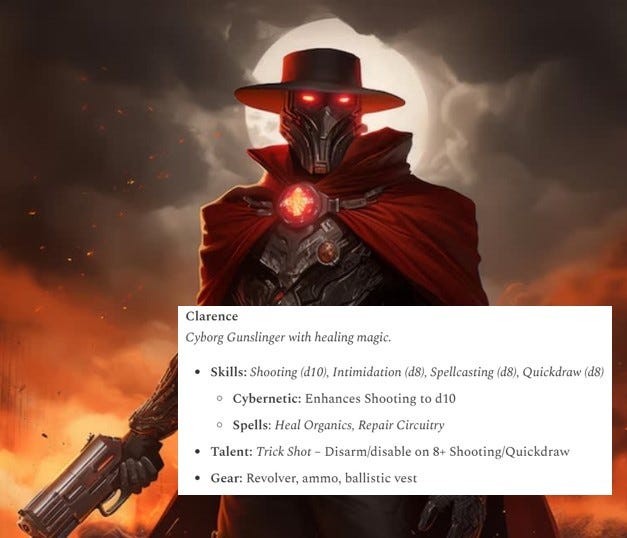Unlocking 24XX: Character Creation
In the 24XX system, character creation is fast, flexible, and endlessly creative, offering clear starting points without stifling your imagination.
If you’ve ever tried building a character in a traditional RPG like Dungeons & Dragons (D&D), you know how quickly things can get complicated. Multiclassing, feats, and endless subclass options can turn character creation into a daunting math problem. That’s where the 24XX RPG system shines—by stripping away unnecessary complexity while giving players total creative freedom. Whether you’re designing a stealthy thief with magical flair or a quirky alien diplomat, 24XX makes it intuitive, fast, and fun.
In this post, we’ll guide you through the character creation process, and show how easy it is to build a unique concept—like a cyborg gunslinger with healing magic.
Character Creation in 24XX: The Basics
Character creation in 24XX is built on a few key principles:
Simplicity: No bloated mechanics or rulebooks; everything is distilled into a handful of straightforward choices.
Flexibility: Players can create highly specific character concepts by combining modular elements like specialties, origins, and talents.
Creativity First: The system encourages inventing new traits, abilities, and skills tailored to your character based on each game’s setting.
In other words, 24XX eliminates the mechanical roadblocks to creating a character exactly how you envision them.
Here’s how it works:
1. Choose a Specialty
Think of this as your character’s role or archetype. Each specialty provides core skills and gear, making it a natural starting point.
Sci-Fi Example: Tech – Skilled in hacking and electronics, with repair tools in tow.
Fantasy Example: Mage – Skilled in spellcasting, with a staff and a choice of four spells.
Weird West Example: Gunslinger – Quick on the draw and deadly accurate, starting with a trusty revolver.
Unlike D&D, where subclasses can feel overly rigid, 24XX specialties give you a foundation while leaving room for creativity. Want a Starship Mechanic instead of a generic Tech? Just tweak the flavor and skills.
2. Pick an Origin
Origins define your character’s background or nature, offering unique abilities and skills that complement your specialty.
Sci-Fi Example: Android – Durable and upgrade-ready, with a bonus to a chosen skill.
Fantasy Example: Elf – Immune to magical sleep and charm, skilled in spellcasting.
Weird West Example: Spirit-Touched – Gifted with supernatural abilities, like seeing ghostly allies.
Origins are simple yet evocative, providing hooks for roleplaying without overwhelming you with rules.
3. Select Skills
Skills in 24XX are represented by die sizes, ranging from d6 (untrained) to d12 (master-level expertise). You can pick from predefined lists or invent your own.
For instance:
A hacker might excel in Hacking (d8).
A wizard might master Spellcasting (d10).
A gunslinger might specialize in Quickdraw (d12).
Customizing skills is a breeze, letting you add niche abilities like Alien Diplomacy or Reading People without disrupting gameplay.
4. Add Optional Talents
Talents, while optional, are a fantastic way to make your character truly stand out. Though not always included in every 24XX game, they can easily be integrated into any setting. Talents add an extra layer of depth by granting your character unique abilities or advantages, letting you take their individuality to the next level. For more details on how to use and create talents, check out the 2400 Talents Article.
Examples of Talents:
Shadow Meld: Automatically succeed on Sneak rolls when hiding in dim light or shadows. This talent embodies the "Reduced Risk" template by granting automatic success in specific circumstances, allowing your character to vanish effortlessly in low-light settings.
Precision Disarm: When you succeed on a melee attack roll, you can immediately disarm your opponent as a bonus effect. This applies the "Bonus Effect" template, giving your character an additional tactical advantage whenever they land a hit in combat.
Tech Bypass: Use your Electronics skill in place of Traps to disable mechanical locks or traps. This talent leverages the "Skill Substitution" template, allowing a tech-savvy character to bypass traditional rogue skills by applying their technological expertise.
By naming talents and tying them to specific mechanics, they become easy to understand and integrate into gameplay, while still providing plenty of creative freedom to suit any character concept.
Extended Example: The Cyborg Gunslinger with Healing Magic
Let’s explore how easy it is to create a distinctive character in 24XX by designing a cyborg gunslinger who can also cast healing magic. In most traditional RPGs, this concept might require complex multiclassing or house rules. In 24XX? It’s straightforward and natural.
Step 1: Choose a Specialty
We’ll start with Gunslinger, a specialty focused on sharpshooting and quick reactions.
Skills: Shooting (d8), plus 3 additional skills.
Gear: A revolver, extra ammunition, and a light ballistic vest.
This gives us the foundation of a skilled sharpshooter with the tools to dominate in ranged combat.
Step 2: Pick an Origin
For the cyborg element, we’ll select or create an origin that reflects their technological enhancements.
Custom Origin (Cyborg) – Cybernetic implant that enhances any existing skill to a d10 (e.g., Shooting moves from d8 to d10).
The cyborg origin provides the mechanical framework for our character’s cybernetic nature.
Step 3: Select Skills
We’ll refine the character by selecting or inventing skills to reflect their gunslinging prowess and magical healing abilities.
Shooting (d8): Essential for their Gunslinger specialty.
Intimidation (d8): The ability to influence or manipulate others through fear, threats, or commanding presence.
Spellcasting (d8): For healing spells and magical abilities.
We’ll start with two spells known: Heal Organics and Repair Circuitry.
Quickdraw (d8): Ensures they can act swiftly in high-stakes duels.
These skills combine the precision of a trained gunslinger with the ability to heal allies in the heat of battle.
Step 4: Add Talents (Optional)
To enhance their unique abilities, we’ll choose one talent that complements their concept.
Trick Shot: When rolling 8+ on a Shooting or Quickdraw roll, disarm or disable an enemy as a bonus effect. (This talent uses the "Bonus Effect" template to add tactical flair.)
This talent elevates the character’s competency, without adding any complexity.
Step 5: Name and Describe the Character
Name: Clarence
A cyborg gunslinger who combines precision shooting with healing magic, relying on cybernetic enhancements and spells to keep their allies alive and enemies at bay.
Why 24XX Excels for Unique Hybrid Concepts
In D&D, this character would require awkward house-ruling and/or multiclassing between Fighter, Cleric, or Artificer, likely sacrificing skill progression or spellcasting capabilities. It’s just too niche a concept for a class-based system to acommodate.
However, in 24XX, by combining specialties, origins, and talents, you can create this unique and fully realized character in just a few steps. There’s no need for compromises or convoluted mechanics—the system naturally supports creative and unique concepts. With 24XX, creating a cyborg gunslinger who casts healing magic isn’t just possible—it’s quick, intuitive, and rewarding. And look at how minimal the final “character sheet” is!
24XX Characters: Creativity Without Complexity
24XX demonstrates that you don’t need sprawling rulebooks or convoluted mechanics to craft vibrant, memorable, and mechanically balanced characters. With its streamlined design, character creation is fast and intuitive, making it perfect for newcomers or players who want to jump into the action without spending hours building a character. Whether you’re a magical thief, an alien starship pilot, or a gunslinging android, 24XX empowers you to focus on what matters most: storytelling, roleplaying, and fun.





Thank you so much. These have been great reads, like everything else. Looking forward to more!
Great read. Quick question: in the post you mention an 2400 Talents Article. Is that a separate post or link?